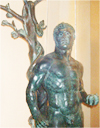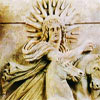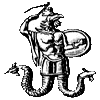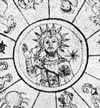Having checked the history of the early church to the time of Constantine, I find the claim that the church apostasized after the death of the last apostle around 100 AD as being grossly mistaken.
To cut a long story short it appears that those holding high ranks (ie the bishops) in the church did eventually become corrupted through lust for power and glory culminating in the unnatural union with the Roman State but there never was a wilful corruption of doctrine and loss of Divine Grace as the JWs claim in that period.
Things with the R&F carried on much as under the apostles with some churches being spiritually strong and some weak. Things like the Trinity, soul immortality and prayers to the saints seemed to have biblical backing, whereas doctrines that were clearly unapostolic like the those of the gnostics were succesfully resisted.
The real problem came post Constantine after the church got flooded by pagans who didn't seriously want to be Christians and standards became very lax.
Apostasy in the early church? NO
by greendawn 9 Replies latest watchtower scandals
-
greendawn
-
Gretchen956
Those damm pagans again. I guess thats why they burned us at the stake for so long, huh?
Sherry
-
kid-A
Pagans Rock!!!!!
-
greendawn
Gretchen pagans were never burned as far as I know instead it was the so called witches. In fact the pagans didn't get that badly treated by the Christians given the attrocious way in which they had treated them under the Roman emperors.
As for the neo pagans I don't know why they want to regress way back to primitive religions in this day and age. -
Forscher
In Revelation 2:4-6 apostacy is mentioned. And one particular group, the Nicholaitans are named. So there was some measure of apostasyeven then.
Forscher -
Narkissos
Here's an interesting article on this very issue: http://www.robertmprice.mindvendor.com/diaspora.htm
To put it short, I think Christian orthodoxy, not heresy, is what emerged in the so-called "post-apostolic" age, making many trends of the originally diverse early "Christianity" appear, retrospectively, as heretic. Iow, the idea of an originally united and orthodox Christianity, as illustrated in Acts, is a 2nd-century fiction -- a foundational myth for the 2nd-century great (proto-Catholic) Church -- much as Moses' Deuteronomism is a fiction retrojected on Israel's past by the heirs of Josiah's reform, making the old religion of Israel with its many sanctuaries, gods and goddesses, retrospectively appear as apostate.
He who controls the past, controls the future -- Orwell's description applies perfectly to the Bible's "great narratives" imo.
-
Ianone
Kid A, why you sportin the Masonic compass and protractor?
Green: I believe the apostasy started with the inception of Zionism in the early 1900s. Hal Lindsey, a false prophet on record, is one of the pioneers of of the unholy alliance of Christianity and Zionism.
As a Post Millenialist myself, we are at the time AFTER the 1000 year reign of Christ, which I believe to be the church age, where Satan is unleashed for a short time. It is during this short time that the apostasy grows and engulfs the world along with all the other false religions.
I believe Satan was unleashed during the 1700's with the birth of the Illuminatti in Bavaria. The Illuminatti since than has used front after front to attack and undermine Christ and His faithful. Be it Zionism, Cults, Freemasonry, Jesuits etc..., the apostasy is at the point of the "Strong Delusion."
Buckle your seatbelt.
the Noahide Laws call for the decapitation of idolators. Under Noahide Law #2, worship of Jesus is idolatry and worthy of the death penalty (Sanhedrin 57a, Babylonian Talmud). -
Ianone
Part of my statement might seem confusing , let me clear it up.
As a Post Millenialist (Millenial Reign is Past) I believe we are in the time where Satan has been unleashed.
The Bible speaks of Satan being unleashed after the 1000 year reign of Christ. Satan controls this whole globe. The Banking cartel, drug cartel, academia, media, religion, you name it. It is all controlled. Hopefully a few ex jws can appreciate the fact that the Watchtower is correct in that all the world is Satanically contorolled. But the Watchtower is one of those Satanic instruments to undermine the Divinity of Christ and control people - the more important issue.
Pre Millenialism - believes that the 1000 year reign of Christ is future (these are usually Zionist and Dispensationalists)
Amillenialism - Does not believe there is a literal 1000 year reign of Christ but that the church age lasts a very long time while the world receives the gospel.
Post Millenialism - believes that the 1000 year reign , is literal, give or take a few hundred years, and was in the past , during the church age. (Post Millenialists are all Post Tribulation as well, that is believe that all the world, including Christians, go through the Satanic tribulation, as opposed to Pre Millenialists who believe in the rapture cult bologni, that they are magically whisked away before the tribulation. -
Oroborus21
You need to keep researching a bit further.The Constantine era is when what we know as orthodoxy became orthodoxy. For 2 centuries before that there were bodies of faith and interpretations of Christianity battling for followers and supremacy. We only know a bit of the "losers" like the Gnostics (more now since the findings of Nag Hamadi) and others, from a few writings of the church fathers and since most of these works (advocating these non-orthodox views) were lost, suppressed or destroyed we may never know the full extent of the conflicts.
The point is that "apostacy" had certainly crept into the early church, even Paul refers to some of these "heretical" teachings and some scholars feel that a few of the letters attributed to Paul were actually direct reactions to such apostacies.
The bottom line is that there probably was never a "pure" unadulterated form of Christianity and persons had different ideas and views from the beginning. Even the disciples had different views of God's Kingdom, Jesus' purpose, their future, etc. Do you think these differences just resolved themselves when he went away? No, rather they intensified. They fought over how Jewish Christians should be and how Christian Jews should be. They fought over control, and leadership and doctrine and these fights have never stopped.
There are only a few elemental things in Christianity that have remained more or less true, perhaps only one - that Christ died for us.
The idea that all Christians have always agreed on everything else is a fairytale.
-Eduardo Leaton Jr., Esq.
-
ICBehindtheCurtain
This websit is very interesting shedding much light on the bible, christianity and judaism among others, check it out!
What DID the Early Christians Believe?
Shadowy Mr Big behind worldwide criminal organisation. Known variously as 'Jesus', 'Christ', 'Lord', and 'Saviour'. Persistent rumours of a brief appearance in Palestine though unknown in official records. Cult members convince themselves JC is alive today. Intelligence suggests never actually existed.
email the author –Kenneth Humphreys
Site Search: search tips site map 25.03.05
Hercules. Now let's see ...
• born from a god (Zeus) and a mortal virgin mother (Alcmene).
• while still an infant, a jealous goddess, Hera, tried to kill him.
• performed miraculous deeds.
• descended into Hades.
• died in agony.
• rose again as a god.
Should we believe in an historical Hercules? He's mentioned by Tacitus, Josephus and others.
In short, we have as much (that is, as little) evidence for an historical Hercules as an historical Jesus.
Hercules carries his "cross"12th Labour
Hercules at the tree of Hesperides, with apples and a snake. Sound a tad familiar?
(British Museum)Christians today, who affect such certainty over what their godman said and did, might be well served to pause and reflect that Christians who lived within a generation or two of their supposed saviour had no such certainty, that they speculated wildly, disagreed with each other to the point of violence, and organised rival churches.
For more than two hundred and fifty years the enthusiasts of Christ concocted astonishing fairy tales drawn from Pagan and Jewish antecedents and their own imagination.
Let's consider a few thorns in the crown of the godman.
Sun God1. Precisely when did this story spread?
Bizarre Beginnings – The Assortment of Early Christian Belief
Inconvenient fact: many cardinal "Christian" beliefs, including belief in a sacrificial godman, had been widespread for centuries before the Christians appeared. The evidence shows clearly that the Christians took over pre-existing beliefs and sacraments rather than introduced new ones.
Abraxas Jesus
2. Precisely what story got off the ground? Nice Gnostics – Christian 'Mystics of Knowledge'
Inconvenient fact: early Christianity was characterized by wildly variable beliefs about their hero. The earliest Christian theorists denied a physical incarnation of their Lord and knew nothing of the Bethlehem saga.
Zodiac Jesus3. Precisely where did this story spread? Inconvenient fact: The middle decades of the 2nd century were the most prosperous age of the Roman Empire. With the catastrophic defeat of the Jews in 135 everything Jewish was treated with opprobrium. Christian writers in the great cities of the empire scrambled to use Greek logic and the style of the sophists to defend Christianity. The Jewishness of the faith was purged but the apologists had little to say about a human Jesus. They took comfort in noting similarities between their own ideas and pagan myths.
4. A mass following? Orthodoxy and the Early Church
Inconvenient fact: evidence of early Christian communities is scanty. The Christians remained a minority until well after one particular faction formed a political alliance with the State. The orthodox creed was unpopular for centuries; persecution was necessary to impose its will.
Pagans campaigned to restore the Altar of Victory to the Senate House as late as the early 5th century.
Copyright © 2005 by Kenneth Humphreys.
Copying is freely permitted, provided credit is given to the author and no material herein is sold for profit.






 Abraxas Jesus
Abraxas Jesus
